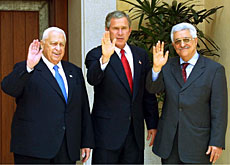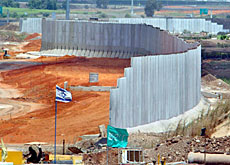Road map divides Swiss Jews and Palestinians

A landmark Middle East conference has ended with both Israeli and Palestinian leaders agreeing to back an international "road map" to peace.
Swiss Jewish groups are upbeat that the plan stands a real chance of resolving the crisis, but Palestinians in Switzerland are sceptical.
The Israeli and Palestinian prime ministers both backed the peace plan at their first face-to-face meeting in the public eye in the Jordanian resort of Aqaba, which was also attended by President Bush.
At the historic meeting, the new Palestinian prime minister, Mahmoud Abbas renounced acts of violence against Israel and called for the armed intifada or uprising to end.
Israel’s Ariel Sharon pledged support for a two-state solution, involving the creation of a Palestinian state and agreed to dismantle recent unauthorised Jewish settlements in the occupied territories.
But the Switzerland-Palestine Association is not optimistic that the so-called road map to peace – engineered by the United States, the European Union, Russia and the United Nations – will resolve the Middle East crisis.
Future state
“The [future state] will not be viable in the eyes of the Palestinians,” spokesman, Peter Leuenberger, told swissinfo. “It will not be politically and economically independent and will be in the style of a Bantustan (a partly self-governing homeland).”
The Swiss Federation of Jewish Communities, on the other hand, views the outcome of the Aqaba summit with more optimism.
Vice-president Thomas Lyssy told swissinfo that he hoped it signalled a new beginning for the peace process in the region.
“Jews all around the world are waiting for peace in this area. Peace is achievable now,” he said.
“Jews in Switzerland share the same political views as Jews in Israel. We have people who are left- and right-wing, and I can speak for everyone when I say we hope the summit is part of a new peace process,” he added.
The Swiss government also welcomed the statements made at Aqaba. The foreign ministry urged the parties concerned to take all measures necessary to ensure the “road map” was implemented.
Flawed
Leuenberger believes the plans are flawed at best and at worst do not take into account the considerations of the Palestinian people.
A serious flaw in Leuenberger’s opinion is the lack of definition of the boundaries of a new Palestinian state.
“It should include East Jerusalem as the capital but this is not even mentioned [in the proposals].”
Most significantly, according to Leuenberger, the right of return for Palestinian refugees has not been addressed in the latest peace talks.
“More than half of Palestinians are living as refugees, [who would fall] outside the territory of a new state.”
swissinfo, Faryal Mirza and Karin Kamp
The leaders of Israel and the Palestinians have publicly backed the “road map” peace plan.
At a three-way summit with President Bush in Jordan, Israel agreed to dismantle recent illegal settlements.
The Palestinian prime minister renounced acts of violence against Israelis.
The Swiss Federation of Jewish Communities is optimistic that these developments will lead to peace in the region.
However, the Switzerland-Palestine Association believes the “road map” is inadequate.

In compliance with the JTI standards
More: SWI swissinfo.ch certified by the Journalism Trust Initiative


You can find an overview of ongoing debates with our journalists here. Please join us!
If you want to start a conversation about a topic raised in this article or want to report factual errors, email us at english@swissinfo.ch.